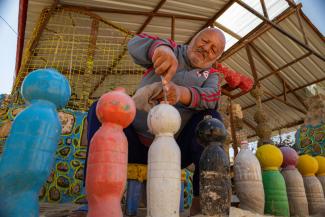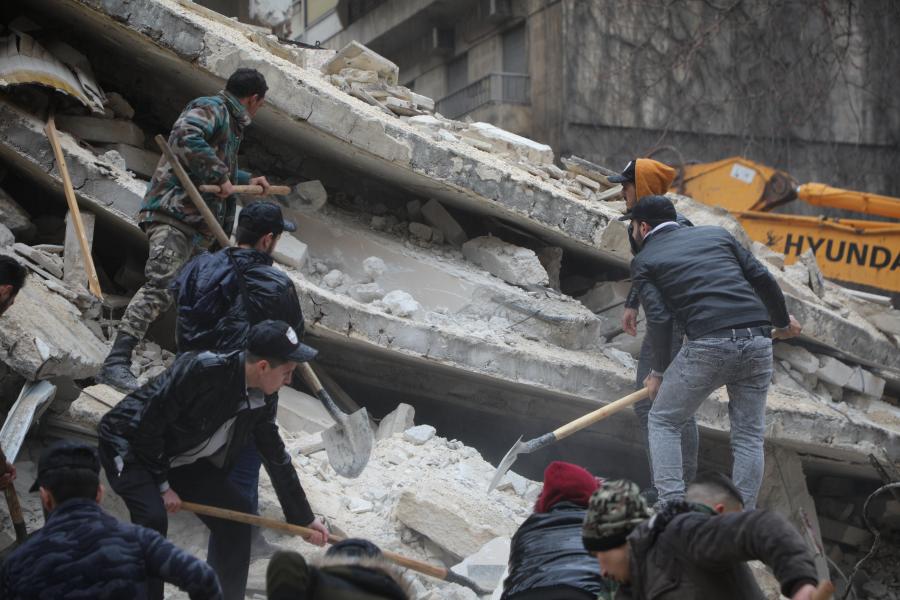2023 situation overview
In its thirteenth year, the crisis in the Syrian Arab Republic remained the world’s largest in terms of displacement, with over 12 million people still forcibly displaced across the region. Egypt, Iraq, Jordan, Lebanon and Türkiye continued to host close to 6 million Syrians.
UNHCR and UNDP co-led the Regional Refugee and Resilience Plan (3RP) in response to the Syrian refugee crisis. It focused on protecting people, supporting durable solutions, contributing to dignified lives, and enhancing local and national capacities with a long-term, solutions-orientated response. Under the plan, a new regional advocacy working group was established to strengthen strategic joint advocacy, resource mobilization, and opportunities to promote inclusive policies for refugees and host communities in the countries falling under the plan.
The humanitarian needs inside Syria intensified following the February 2023 earthquakes. At the end of 2023, 16.7 million people were estimated to need humanitarian assistance in Syria, the highest number since the beginning of the crisis and an increase of 1.4 million from 2022. Some 7.2 million people were internally displaced and there were also 17,100 refugees and asylum-seekers in Syria. Deteriorating economic conditions in Syria caused the collapse of many basic services, shortages of basic commodities, and a significant depreciation of the national currency.
The political and security situation also remained bleak with an escalation of armed conflict in the north-west and north-east of Syria, triggering displacement and resulting in the disruption of essential services. The hostilities in Idleb were the most significant since 2019.
Earthquakes in February and their aftermath claimed the lives of 5,900 people and caused further injuries, displacement and damage to infrastructure that was already affected by years of conflict. UNHCR immediately responded to help people affected by the earthquakes; UNHCR reached over 311,000 people with protection interventions and assisted more than 342,000 people with 68,547 core relief item kits, as well as issuing 53,000 people with tents in north-west Syria.
The situation in the main Syrian refugee-hosting countries in the region also worsened, increasing stress on refugees and host communities alike. 90% of the Syrian refugee population in Jordan, Lebanon and Egypt were in debt.
In Lebanon, 90% of Syrian refugees found themselves living in conditions of extreme poverty. In Jordan, the average income of Syrian refugees decreased by 12% at the start of 2023, with diminishing prospects for self-reliance. Despite the worsening conditions, funding for the Syrian refugee crisis declined, exacerbating the already deteriorating protection environment and increasing pressure on host governments and communities. By the end of 2023, only 31% of the overall 3RP ask had been met – the lowest funding level since the Plan’s inception in 2015. The decline in funding for the Syria crisis in the last years poses a significant risk of aggravating tensions in hosting countries, potentially undermining socioeconomic stability.
Unrestricted cash assistance played a vital role in meeting the basic needs of displaced populations and enhancing protection outcomes by mitigating the reliance on harmful coping strategies among affected populations. In 2023, UNHCR supported Syrian refugees with cash assistance in Egypt, Iraq, Jordan and Lebanon – distributing more than $170 million to 1.8 million individuals. An additional $7.3 million was disbursed to 111,000 IDPs across Syria, including in north-west Syria.
Across the region’s main Syrian refugee-hosting countries, 783,000 refugee children were enrolled in formal and non-formal education, 175,000 people received gender-based violence response services, and 104,000 girls and boys received specialized child protection services by the end of the year.
Due to limited funding, for the first time, UNHCR was unable to provide winter cash assistance to Syrian refugees across Egypt, Iraq, Jordan and Lebanon and to Syrian IDPs, compared to the $1.86 million in cash assistance disbursed for Syrians across Iraq, Jordan, Lebanon and Syria in 2022.
The eighth regional survey on “Syrian refugees’ perceptions and intentions on return to Syria” found that only 1.1% of refugees intended to return to Syria in the next 12 months, citing concerns over safety and security, livelihoods, basic services and housing as the main factors influencing their decision-making.
Continued support to refugee-hosting countries was therefore considered critical to address humanitarian needs, maintain protection space and advance resilience. Notwithstanding a number of political initiatives in 2023, the conditions inside Syria were not yet conducive for the facilitation of large-scale voluntary returns in safety and dignity. Some 38,300 refugees returned to Syria in 2023, a decrease from almost 51,000 refugees who opted to return in 2022.
Resettlement and complementary pathways remained the most viable durable solution for Syrian refugees who represented the population with the highest global resettlement needs in 2023. Over 777,000 Syrian refugees were projected to be in need of resettlement across the region and in Türkiye. However, annual resettlement opportunities covered less than 5% of the need; 30,000 Syrians departed for resettlement in 2023, primarily from Jordan, Lebanon and Türkiye – a notable increase from 22,700 in 2022 due to a rise in departures to the United States.
UNHCR and its partners continued working on the prevention and reduction of statelessness in the region, including through capacity development, legal assistance for individuals and by supporting the civil documentation and birth registration activities of local and national authorities. These efforts yielded positive outcomes: for example, almost 95% of Syrian refugee children born in Egypt, Iraq, Jordan and Lebanon had received some form of birth documentation by the end of 2023.
Financial overview
Download the 2023 funding update
The 2023 requirements for the Syria situation do not comprehend the requirements for the population affected by the earthquake in February 2023. The latter can be consulted here.
More contributions information on previous years: Funding Update 2022 | Funding Update 2021
Syrian refugee turns trash into treasure in Jordan
By Sandra Quiroz in Za'atari camp, Jordan
In Za’atari refugee camp, Ziyad Al-Awaji, also known as Abu Jihad, wakes up before dawn to begin his daily routine of scavenging for discarded plastic and other materials in the garbage dumps.
His creative spirit and unwavering determination have transformed discarded materials into objects of beauty.
Read the story

